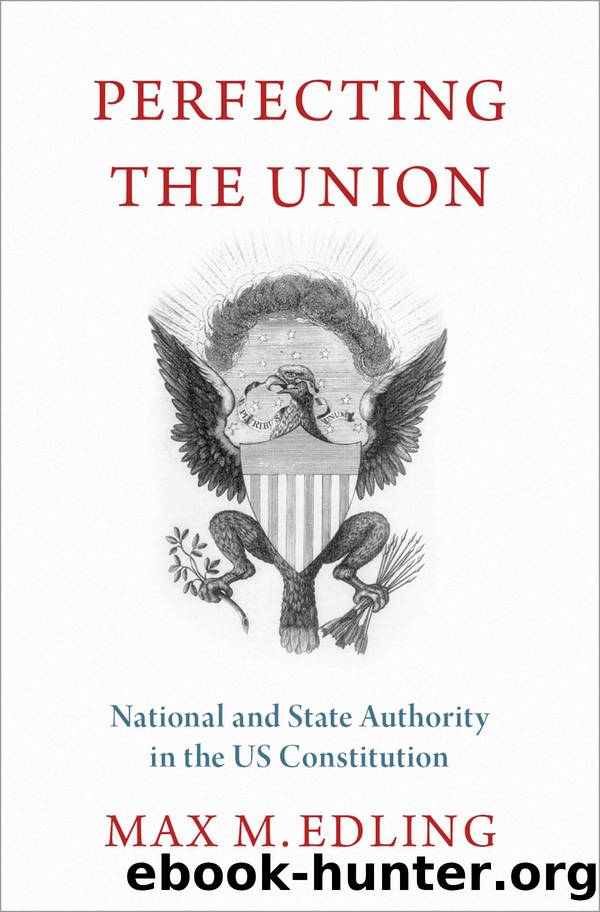Perfecting the Union by Max M. Edling

Author:Max M. Edling [Edling, Max M.]
Language: eng
Format: epub
Published: 2020-05-15T00:00:00+00:00
I
Englandâs Glorious Revolution was followed by a dramatic upsurge in parliamentary activity. In the two centuries before 1688, Parliament passed around 2,700 acts. Between 1688 and 1800, it passed more than 13,600 acts and turned down some 5,600 legislative proposals. The volume of legislation increased gradually as the eighteenth century progressed. Between 1689 and 1714 (i.e., before the accession of George I), Parliament passed around 45 acts every year. In the 1790s, the annual average had jumped to 275 acts. The growth in legislation was caused by the constitutional changes following the events of 1688. In the seventeenth century, the monarch and the courts regulated and governed society. In the eighteenth century, Parliament became the principal institution of the British government and the Act of Parliament became the principal instrument of government.11
Parliamentâs rise in importance was a boon to the social classes that elected itâthat is, the landowning gentry and, to a lesser extent, the merchant class. These groups made use of parliamentary legislation to meet the demands of a changing society. The vast majority of legislation in the eighteenth century originated with individuals and small groups seeking the authority of an Act of Parliament to further their specific and local interests. Most legislative activity can be described as economic and domestic in nature, directly or indirectly concerned with wealth and income. An Act of Parliament bestowed authority on local bodies of diverse kinds: turnpike trusts, poor law authorities, charities, improvement commissioners, and the like, and the central government did not pursue national policy as much as it invested local bodies with the power to do so. This defused a long-standing tension between the center and the localities, as Parliament became a resource rather than a threat or competitor to local power magnates. âFor many within the upper echelons of society, the expansion of legislation was central to their financial hopes and commercial aspirations,â Hoppit writes. âWithout the changes that followed 1689 we might doubt whether estate settlements could so readily have been altered, turnpikes built and fields enclosed.â12
Hoppit found that between 1688 and 1800 Parliamentary legislation belonged overwhelmingly to the categories personal legislation, communications, and the economy (see Table 4.1 for classes of legislation). Personal legislation refers to private matters, primarily estate and inheritance legislation. Laws pertaining to the economy were primarily concerned with enclosures. In the period from 1688 to 1714, slightly more than three-fifths of all acts fell in these three categories. In the four decades between 1760 and 1800, the figure rose to just above 70 percent of the total. The relative importance of the three categories shifted over time, however. In the period to 1714, close to half the total number of acts belonged in the personal class. The economy and communications accounted for only 7.7 and 5.1 percent, respectively, of total legislation in these years. Both were dwarfed by financial legislation, which made up 13.9 percent of the total. In the period from 1760 to 1800, however, personal legislation had fallen from half to
Download
This site does not store any files on its server. We only index and link to content provided by other sites. Please contact the content providers to delete copyright contents if any and email us, we'll remove relevant links or contents immediately.
| Anthropology | Archaeology |
| Philosophy | Politics & Government |
| Social Sciences | Sociology |
| Women's Studies |
The Secret History by Donna Tartt(16627)
The Social Justice Warrior Handbook by Lisa De Pasquale(11489)
Thirteen Reasons Why by Jay Asher(7788)
This Is How You Lose Her by Junot Diaz(5774)
Weapons of Math Destruction by Cathy O'Neil(5038)
Zero to One by Peter Thiel(4824)
The Myth of the Strong Leader by Archie Brown(4789)
Promise Me, Dad by Joe Biden(4449)
Beartown by Fredrik Backman(4419)
Stone's Rules by Roger Stone(4416)
How Democracies Die by Steven Levitsky & Daniel Ziblatt(4399)
The Fire Next Time by James Baldwin(4343)
100 Deadly Skills by Clint Emerson(4079)
A Higher Loyalty: Truth, Lies, and Leadership by James Comey(4033)
Rise and Kill First by Ronen Bergman(4012)
The David Icke Guide to the Global Conspiracy (and how to end it) by David Icke(3883)
The Farm by Tom Rob Smith(3872)
Secrecy World by Jake Bernstein(3783)
The Doomsday Machine by Daniel Ellsberg(3731)
